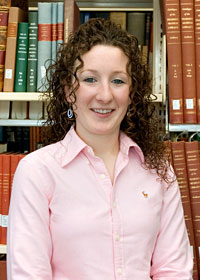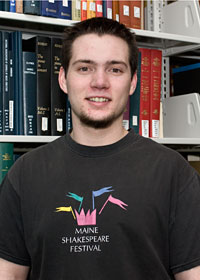  |
| HOME | THIS ISSUE | CALENDAR | GRANTS | BACK ISSUES | < BACK | NEXT > |
Enrichment awards enhance top students’ academic experienceby Sherry Fisher - January 29, 2007 | ||||||
| Hereen Makanji conducted cancer research in New York; Nathaniel Seekins learned about new lighting technologies at a conference in Nevada; and Kelly Thompson was an intern in a fourth-grade classroom. Meghann LaFountain was in Washington, D.C. during summer and winter break, analyzing U.S. Supreme Court decision making; and Zi Xin worked at a three-week unpaid internship in an Ann Arbor dental office. These students are among nearly 300 from a variety of academic disciplines who have received the University's Presidential Enrichment Awards, intended to defray some of the costs of their academic pursuits. The awards are given to those in the Presidential Scholars Program, which was created to reward students ranked number one or two in their high school graduating class. These valedictorians and salutatorians are awarded a one-half tuition scholarship, renewable for four years, and a one-time gift of $2,500 for educational enrichment. They may use these funds for a variety of enrichment activities: research internships, study abroad, or professional travel, at any time during the four years as an undergraduate. "The Presidential Enrichment Awards give students a chance to take their learning beyond the classroom," says Lynne Goodstein, associate vice provost and director of the Honors Program. "Enrichment grants enable students to become involved in the types of academic pursuits that really change lives: studying abroad, interning for a community agency, exploring scientific questions as a member of a research team. The grant can make the difference between a good education and a great one." Hereen Makanji, a sophomore in the combined medical program, participated in an unpaid internship program last summer with researchers in White Plains, N.Y. They investigated the effects of natural and synthetic selenium compounds on three cancerous cell lines isolated from prostates. "We used cell culturing, Western Blotting, and other techniques to uncover the up-and-down regulation of certain proteins in cells treated with the selenium compounds," he says. "Many of these proteins have been accepted as part of the cell proliferation control system, which plays an important role in metastasis of cancer." Makanji says the grant "helped to defray transportation costs to White Plains every day, and also substituted for an income that I might have received from another job, because this internship was unpaid." He adds, "The enrichment award made it easier for me to accept this internship without worrying about making money over the summer." Nathaniel Seekins, a sophomore majoring in design and technical theater, used part of his enrichment award to attend an entertainment lighting conference. "I attended four days of seminars on some of the newest and most widely used products in entertainment lighting," he says. "One two-day seminar was on the computer drafting program called Vectorworks, and another two-day seminar was on a new moving light console called the grandMa." He says Vectorworks allows lighting professionals to draft accurate and detailed light plots, which are essentially diagrams of where lights are to be placed and what an electrician needs to do to color and supply power to them. The grandMa allows programmers to control moving lights - lights that have remotely adjustable properties such as color, focus, and strobe. While at the conference, Seekins also saw two Cirque du Soleil productions that use the new technologies he had just learned about. "The really great part about this experience is that I'm actually applying these tools and knowledge," he says. "I use Vectorworks on a daily basis for my classes and Connecticut Repertory productions, and the department is in the process of purchasing a console out of the same product line that I was trained on. So not only am I benefiting from the experience, but I'm also constantly passing on the knowledge that I gained." Kelly Thompson, a junior majoring in elementary education, used part of her scholarship to support an upaid internship in a fourth-grade classroom in Watertown for three weeks during winter break. She began as a classroom aide, but also designed and taught lessons, and worked one-on-one with children with special needs who were in the regular classroom.
"I helped to tweak curriculum and also made lesson modifications for the students with special needs," she says. "I saved the lessons I created, and plan to use them in my future classroom," she says. She assumed most of the duties of a regular teacher, including morning and recess duty and activities after school, and she led a class for a teacher who had to deal with an emergency. She will complete six weeks in the same classroom in May. Thompson says she gained valuable hands-on experience during the internship. "This has given me a great opportunity to get to know the students and obtain valuable experience that I'll use throughout my remaining years in the Neag School of Education and in my future teaching career," she says. "The scholarship really helped me, because without the stipend, I would not have been able to give this internship my full attention," she says. "It allowed me to assume the role as a full-time teacher, and gain experience that I would not normally have had until my student teaching in the spring semester of next year." Meghann LaFountain, a senior majoring in political science, used part of her grant to do research at the Library of Congress for her University Scholar project and honors thesis. LaFountain , who is minoring in American studies and international studies, spent two weeks in Washington, D.C. during summer and winter break, analyzing U.S. Supreme Court decision making. She focused on two death penalty cases from the 1970s, Furman v. Georgia and Gregg v. Georgia . "At the Library of Congress, I accessed the collections of papers from four of the justices who served on the Court during those cases, taking notes on the memos the justices sent to each other and the memos written by their law clerks, as well as the various drafts of the opinions they wrote in the cases," she says. "I hope to determine how internal communications - memos and notes sent among the justices and between the justices and their law clerks - influenced the decision-making process in these two cases." LaFountain says she learned a lot from her research. "I found it very exciting that I could access original documents made by the justices, rather than just look at photocopies and excerpts found in textbooks." She says the Presidential Enrichment Award helped pay for transportation and housing. Zi Xin, a senior, used her award toward an unpaid three-week internship in a dental office in her home town, Ann Arbor , Mich. A molecular and cell biology major who plans a career in dentistry, Xin worked four days a week, 10 to 11 hours a day, with a young female dentist. "I provided assistance and observed every aspect of the dental office," she says, including preparing lab work, dental assisting, and clerical responsibilities. "I have worked in dental offices before, but from this experience I learned a very valuable lesson," Xin says. "I saw how challenging it is for a young female to be the sole owner of a dental office, in addition to balancing family life. I know now to expect difficulties in the career that I chose." She says the scholarship "helped tremendously. Being a college student, I'm always short on cash. Typically, I would have chosen a meaningless part-time job over a career-related volunteer experience. Without the scholarship, I probably would not have had the opportunity to work with Dr. Lee for an extended period of time." |
||||||
| ADVANCE HOME UCONN HOME |


